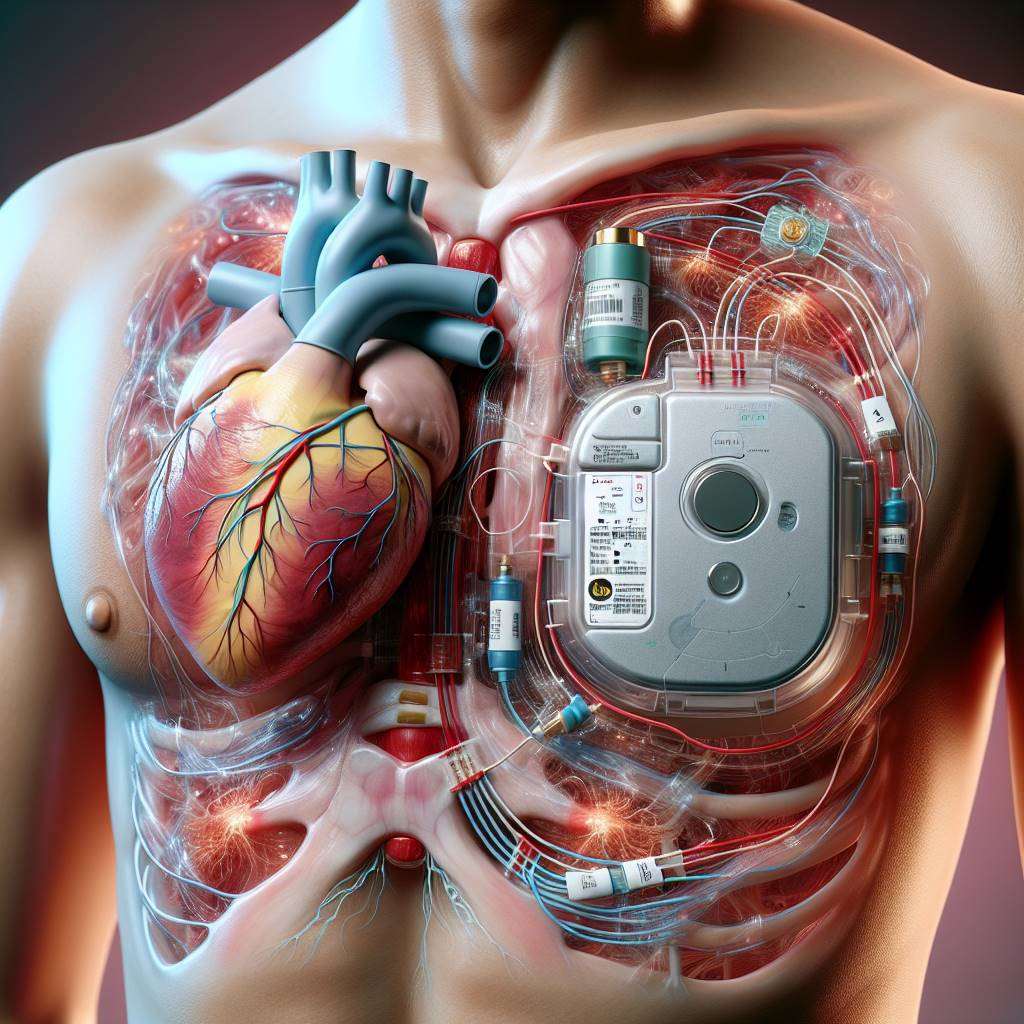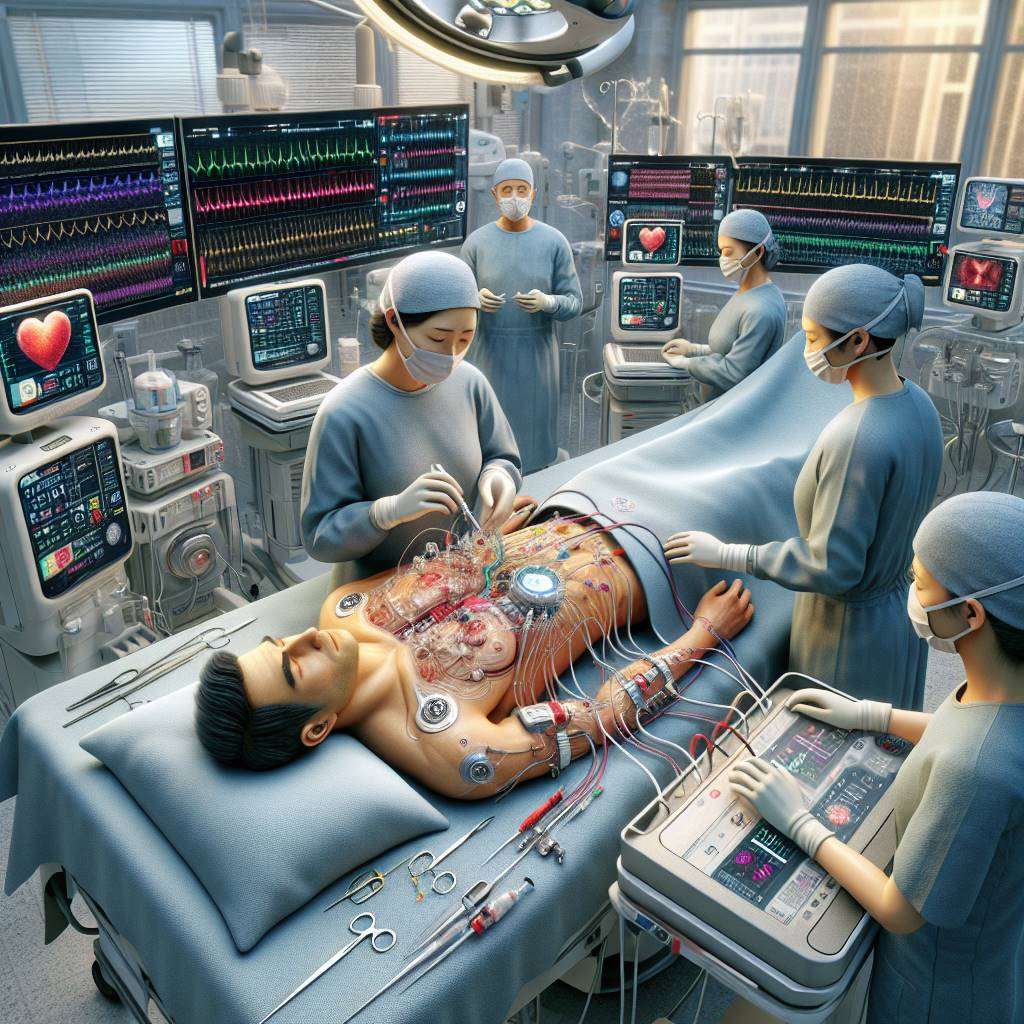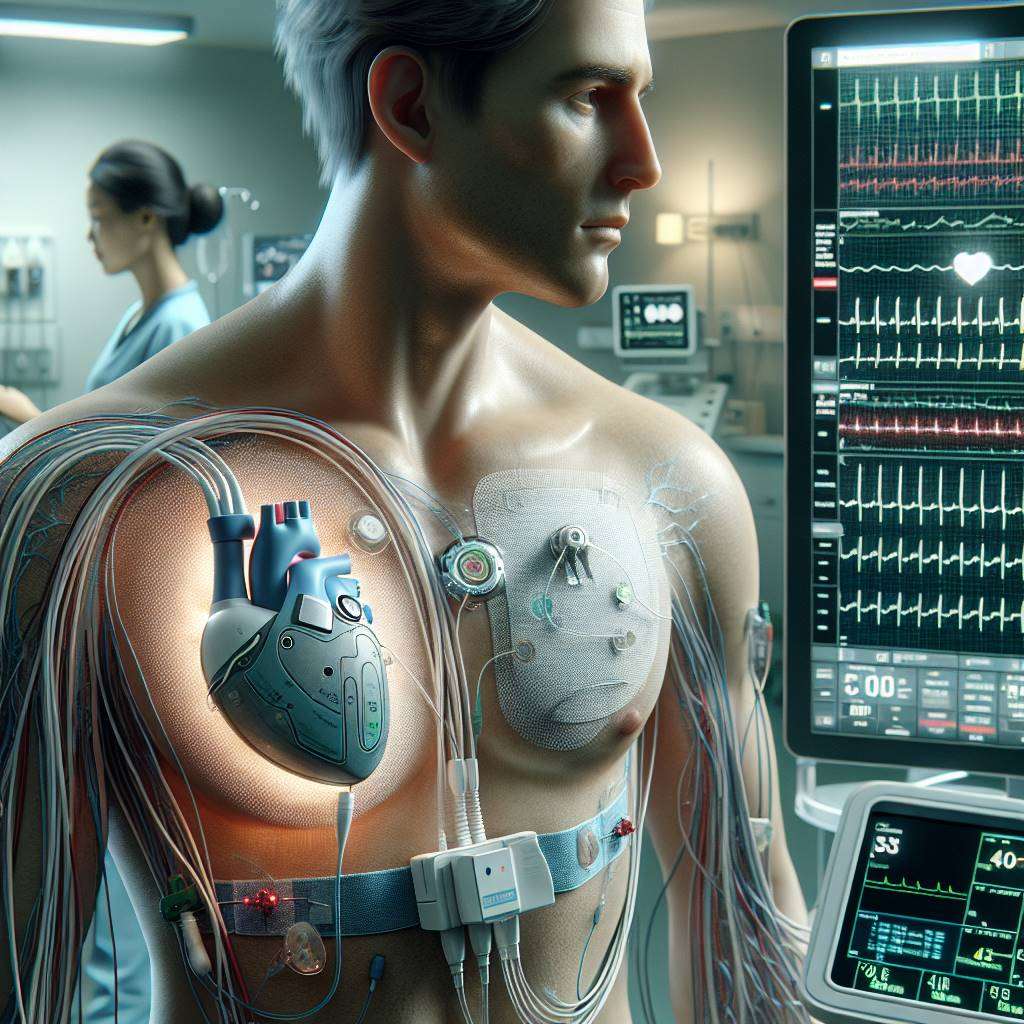Automated Implantable Cardioverter Defibrillator (AICD) technology has become a cornerstone in managing life-threatening cardiac arrhythmias. By delivering timely electrical shocks, these devices prevent sudden cardiac arrest and save lives. With the integration of AI and smart algorithms, AICD devices are evolving to provide more accurate and personalized care for patients with heart conditions.
Medical disclaimer: This content is for general awareness and does not replace a doctor’s consultation. For diagnosis or treatment decisions, consult a qualified specialist.
The combination of artificial intelligence and advanced algorithms is transforming how AICD devices monitor and respond to irregular heart rhythms. These innovations not only improve device efficiency but also enhance patient outcomes by reducing unnecessary interventions. Understanding these advancements is crucial for both healthcare providers and patients seeking cutting-edge cardiac care.
What Is AICD Technology and How Does It Work?
An Automated Implantable Cardioverter Defibrillator (AICD) is a small device implanted in patients at risk of sudden cardiac arrest. It continuously monitors the heart's rhythm and delivers electrical shocks when it detects life-threatening arrhythmias like ventricular fibrillation or tachycardia. This ensures the heart returns to a normal rhythm, preventing fatal outcomes.
AICD devices consist of a pulse generator and leads that connect to the heart. The pulse generator houses the battery and circuitry, while the leads detect abnormal rhythms and deliver therapy. Over the years, these devices have evolved to include features like remote monitoring and data storage, enabling better management of cardiac health.
With the integration of AI, AICD technology is now capable of learning from patient data, improving its ability to predict and respond to arrhythmias. This advancement is a significant step forward in personalized medicine.

The Role of AI in Advancing AICD Devices
Artificial intelligence (AI) is playing a transformative role in enhancing the capabilities of AICD devices. By analyzing vast amounts of patient data, AI algorithms can identify subtle patterns in heart rhythms, enabling earlier detection of potential arrhythmias. This proactive approach reduces the risk of sudden cardiac events.
AI-powered AICDs also offer improved decision-making capabilities. For instance, they can differentiate between life-threatening arrhythmias and benign irregularities, minimizing unnecessary shocks. This not only enhances patient comfort but also extends the device's battery life. Additionally, AI enables real-time adjustments to therapy, ensuring optimal performance for each individual.
The integration of machine learning and predictive analytics into AICD technology is paving the way for smarter, more efficient cardiac care. These advancements are particularly beneficial for patients with complex heart conditions, as they provide a higher level of precision and reliability.
Smart Algorithms Revolutionizing Cardiac Device Performance
Smart algorithms are at the heart of the latest advancements in AICD technology. These algorithms analyze data from the device's sensors to detect abnormal heart rhythms with greater accuracy. By using real-time data, they can differentiate between dangerous arrhythmias and harmless irregularities, reducing false alarms and unnecessary interventions.
One of the key benefits of smart algorithms is their ability to adapt to individual patient needs. For example, they can learn from a patient's unique heart rhythm patterns and adjust the device's response accordingly. This personalized approach enhances the effectiveness of cardiac therapy and improves patient outcomes.
- Improved detection of arrhythmias
- Reduced false positives
- Enhanced battery efficiency
- Personalized treatment adjustments
As these algorithms continue to evolve, they are setting new standards for the performance and reliability of AICD devices, ensuring better care for patients with heart conditions.
How AI Enhances Accuracy in AICD Functionality
The integration of AI into AICD devices has significantly improved their accuracy in detecting and treating arrhythmias. Traditional devices relied on pre-programmed thresholds, which could sometimes lead to false alarms or missed events. AI, however, uses advanced data analysis to make more precise decisions.
AI-powered AICDs can analyze complex heart rhythm patterns in real time, identifying subtle changes that may indicate an impending arrhythmia. This allows the device to intervene earlier, preventing serious complications. Additionally, AI reduces the likelihood of inappropriate shocks, which can be distressing for patients and impact their quality of life.
By enhancing the accuracy of cardiac monitoring and therapy, AI is helping to build trust in AICD technology among both patients and healthcare providers. This innovation represents a significant leap forward in the field of cardiology.
Latest Innovations in AICD Technology Using AI
Recent advancements in AICD technology have been driven by the integration of AI and machine learning. These innovations include features like predictive analytics, which can forecast potential arrhythmias based on historical data. This allows for earlier interventions and better management of cardiac health.
Another breakthrough is the development of remote monitoring systems. AI-powered AICDs can transmit data to healthcare providers in real time, enabling continuous monitoring without frequent hospital visits. This is particularly beneficial for patients in remote areas or those with limited access to specialized care.
| Feature |
Benefit |
| Predictive Analytics |
Early detection of arrhythmias |
| Remote Monitoring |
Improved access to care |
| Personalized Therapy |
Better patient outcomes |
These innovations are not only improving the functionality of AICD devices but also making them more accessible and effective for a broader range of patients.
Benefits of AI-Powered AICD for Heart Patients
Artificial Intelligence (AI) is revolutionizing the way Automatic Implantable Cardioverter Defibrillators (AICD) function, offering significant benefits for heart patients. These devices are now equipped with AI-powered features that enhance their ability to monitor and respond to abnormal heart rhythms.
One of the key advantages is the ability to provide real-time data analysis. AI algorithms can detect subtle changes in a patient’s heart activity, enabling early intervention and reducing the risk of sudden cardiac arrest. Additionally, AI-powered AICDs can adapt to individual patient needs, ensuring personalized care.
Other benefits include improved battery life, reduced unnecessary shocks, and better integration with remote monitoring systems. These advancements not only improve patient outcomes but also enhance their quality of life.

Predictive Analytics in Modern AICD Devices
Predictive analytics, powered by AI, is a game-changer in modern AICD technology. These devices now use advanced algorithms to analyze historical and real-time data, predicting potential cardiac events before they occur. This proactive approach helps in preventing life-threatening complications.
For instance, AI can identify patterns in heart rhythms that indicate an increased risk of arrhythmias. By alerting healthcare providers early, it allows for timely adjustments in treatment plans. This reduces hospitalizations and improves overall patient care.
Moreover, predictive analytics enhances the efficiency of AICDs by minimizing false alarms and unnecessary interventions. This not only benefits patients but also reduces the burden on healthcare systems, making it a win-win for all stakeholders.
How Smart Algorithms Improve AICD Patient Outcomes
Smart algorithms are at the core of the latest advancements in AICD technology. These algorithms enable the device to learn and adapt to the unique needs of each patient, ensuring optimal performance.
One of the key improvements is the reduction of inappropriate shocks. Traditional AICDs sometimes deliver shocks unnecessarily, causing discomfort and anxiety for patients. Smart algorithms can differentiate between life-threatening arrhythmias and benign irregularities, ensuring that shocks are delivered only when absolutely necessary.
Additionally, these algorithms facilitate seamless integration with remote monitoring systems, allowing healthcare providers to track patient data in real time. This leads to more informed decision-making and better long-term outcomes for heart patients.
- Reduced inappropriate shocks
- Improved patient comfort
- Enhanced remote monitoring capabilities
AI and Machine Learning in Cardiac Device Development
The integration of AI and Machine Learning (ML) in cardiac device development is paving the way for groundbreaking innovations. These technologies enable the creation of smarter, more efficient AICDs that cater to the evolving needs of patients.
AI and ML are used to analyze vast amounts of data, identifying trends and patterns that were previously undetectable. This helps in designing devices that are not only more accurate but also more reliable. For example, ML algorithms can predict battery life more precisely, ensuring timely replacements and uninterrupted device performance.
Furthermore, these technologies are driving advancements in customized treatment plans, allowing for a more personalized approach to cardiac care. This marks a significant step forward in improving patient outcomes and satisfaction.
Future Trends in AICD Technology and Artificial Intelligence
The future of AICD technology is closely tied to advancements in Artificial Intelligence. Emerging trends indicate a shift towards more intelligent and autonomous devices that require minimal human intervention.
One promising development is the use of AI for predictive maintenance. This involves monitoring the device’s performance and predicting potential issues before they arise, ensuring uninterrupted functionality. Another trend is the integration of wearable technology, which allows for continuous monitoring and data collection.
Additionally, the use of blockchain technology for secure data storage and sharing is gaining traction. This ensures patient privacy while enabling seamless communication between devices and healthcare providers. These trends highlight the potential of AI to transform the landscape of cardiac care in the coming years.
| Feature |
Benefit |
| Predictive Maintenance |
Ensures uninterrupted device performance |
| Wearable Integration |
Continuous monitoring and data collection |
| Blockchain Technology |
Enhanced data security and privacy |
How AI Reduces False Alarms in AICD Systems
Artificial Intelligence (AI) is revolutionizing the accuracy of Automatic Implantable Cardioverter Defibrillators (AICDs) by minimizing false alarms. Traditional AICD systems often trigger unnecessary shocks, causing discomfort and anxiety for patients.
AI-powered algorithms analyze complex cardiac data in real-time, distinguishing between life-threatening arrhythmias and benign irregularities. This ensures that shocks are delivered only when absolutely necessary, improving patient outcomes and quality of life. Additionally, these systems adapt over time, learning from patient-specific data to further enhance accuracy.
Key benefits include:
- Reduced patient stress due to fewer false alarms
- Improved battery life of AICD devices
- Enhanced trust in the technology for both patients and healthcare providers

Personalized AICD Therapy with AI-Driven Insights
AI is enabling personalized therapy for AICD patients by leveraging advanced data analytics. Each patient’s heart condition is unique, and AI ensures that treatment is tailored to their specific needs.
By analyzing historical and real-time data, AI identifies patterns in a patient’s cardiac activity. This allows the AICD to adjust its settings dynamically, ensuring optimal performance. For example, AI can fine-tune the sensitivity of the device to detect arrhythmias more accurately.
Personalized therapy not only improves the effectiveness of the device but also reduces the risk of complications. This approach empowers healthcare providers to make informed decisions, offering better care for patients with cardiac arrhythmias.
Challenges in Integrating AI with AICD Technology
Despite its potential, integrating AI into AICD technology comes with challenges. One major hurdle is ensuring the reliability of AI algorithms, as errors could have life-threatening consequences.
Another challenge is data privacy. AICDs collect sensitive patient data, and ensuring its security is critical. Regulatory compliance is also a concern, as medical devices must meet stringent standards before approval.
Additionally, the high cost of AI-enabled AICDs may limit accessibility for patients in low-income regions. Addressing these challenges requires collaboration between healthcare providers, technology developers, and regulatory bodies.
| Challenge |
Impact |
| Algorithm reliability |
Potential for incorrect shocks |
| Data privacy |
Risk of breaches |
| Cost |
Limited accessibility |
AI-Powered Remote Monitoring for AICD Patients
Remote monitoring has become a game-changer for AICD patients, and AI is taking it to the next level. AI-powered systems continuously track a patient’s cardiac activity, sending real-time updates to healthcare providers.
This technology allows doctors to detect potential issues early, reducing the need for frequent hospital visits. Patients benefit from increased convenience and peace of mind, knowing their condition is being monitored 24/7.
AI also enables predictive analytics, identifying trends that may indicate future complications. This proactive approach ensures timely interventions, improving overall outcomes for patients with cardiac conditions.
How Smart AICD Devices Are Transforming Cardiac Care
Smart AICD devices, powered by AI and advanced algorithms, are transforming cardiac care. These devices go beyond traditional defibrillation by offering features like real-time monitoring, adaptive therapy, and remote connectivity.
For instance, smart AICDs can adjust their settings based on a patient’s activity level, ensuring optimal performance during exercise or rest. They also integrate seamlessly with mobile apps, allowing patients to track their heart health and share data with their doctors.
These innovations are improving the quality of life for patients with heart conditions, reducing hospitalizations, and enhancing the overall efficiency of cardiac care systems.
Best Aicd Implantation Doctors in India
Dr. Balbir Singh, a renowned cardiologist at Medanta - The Medicity, Gurugram, specializes in AICD implantation with over 30 years of experience. Another expert is Dr. Praveen Chandra, Chairman of Interventional Cardiology at Medanta - The Medicity, Gurugram, with DM Cardiology and extensive international exposure. Both are recognized for their expertise in advanced cardiac care.
Learn more on best aicd implantation doctors in india
Best Aicd Implantation Hospitals in India
Fortis Escorts Heart Institute, New Delhi, and Medanta - The Medicity, Gurugram, are leading hospitals for AICD implantation. Both are NABH and JCI-accredited, offering cutting-edge facilities like robotic cardiac surgery and multidisciplinary care. These hospitals are known for their international patient services and high success rates in cardiac procedures.
Find more best aicd implantation hospitals in india
Aicd Implantation Cost in India
The cost of AICD implantation in India typically ranges from INR 5,00,000 to 10,00,000 (approximately USD 6,000 to 12,000). Factors like hospital type, doctor’s expertise, and device specifications influence the cost. Patients benefit from shorter hospital stays and significant cost savings compared to Western countries. Medical insurance and third-party financing options are widely available.
Learn aicd implantation cost in india
Aicd Implantation Treatment in India
AICD implantation in India involves precise placement of the device under the skin, with leads connected to the heart. Advanced techniques like minimally invasive surgery and robotic assistance are used in top hospitals. Recovery typically takes 1-2 weeks. Indian hospitals adhere to global medical standards and leverage innovations like AI-based monitoring for better outcomes.
Learn on Aicd Implantation Treatment in India
FAQs
What is an AICD?
An AICD, or Automatic Implantable Cardioverter Defibrillator, is a device implanted in the chest to monitor and correct abnormal heart rhythms, preventing sudden cardiac arrest.
Who needs an AICD?
Patients with a history of ventricular arrhythmias, heart failure, or those at high risk of sudden cardiac arrest may require an AICD.
How does an AICD work?
An AICD continuously monitors heart rhythms and delivers electrical shocks to restore normal rhythm when it detects life-threatening arrhythmias.
Is AICD implantation a safe procedure?
Yes, AICD implantation is a safe and routine procedure performed by experienced cardiologists, with minimal risks and high success rates.
What is the recovery time after AICD implantation?
Most patients recover within 1-2 weeks after the procedure, with restrictions on strenuous activities for a few weeks.
How long does an AICD last?
The battery life of an AICD typically ranges from 5 to 10 years, depending on usage and device type.
Can an AICD prevent all heart-related issues?
While an AICD prevents life-threatening arrhythmias, it does not cure underlying heart conditions. Regular follow-ups are essential.
Are there any risks associated with AICD implantation?
Risks include infection, bleeding, or lead displacement, but these are rare when performed by skilled specialists.
Can I travel with an AICD?
Yes, patients with an AICD can travel. However, they should carry their device card and avoid strong electromagnetic fields.
Is AICD implantation covered by insurance in India?
Yes, most health insurance policies in India cover AICD implantation. Patients should confirm coverage with their provider.
Understanding AICDs: Experiences and Mechanisms
An Automated Implantable Cardioverter Defibrillator (AICD) is a vital device for individuals at risk of life-threatening arrhythmias. It not only monitors heart rhythms but also delivers shocks when necessary to restore a normal heartbeat. For those considering or living with an AICD, understanding how it works is crucial. You can explore the fundamentals in our comprehensive guide, What Is an AICD and How Does It Work? A Beginner's Guide.
Experiencing shocks from an AICD can be daunting, and many patients have shared their personal experiences. These insights can help demystify the sensations associated with the device's function. To learn more about what these shocks feel like and how they impact daily life, read our article, How Shocks from an AICD Feel: Patient Experiences Explained.
By understanding both the operational aspects and personal experiences of AICD users, patients can better prepare for their journey with this life-saving technology.